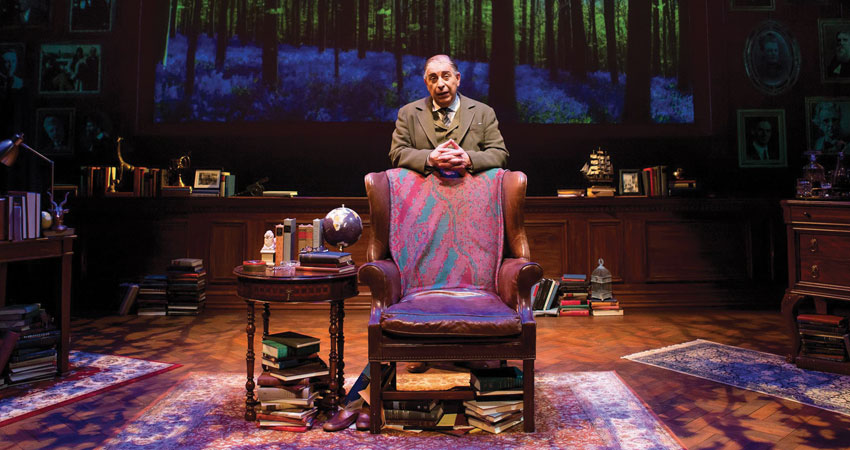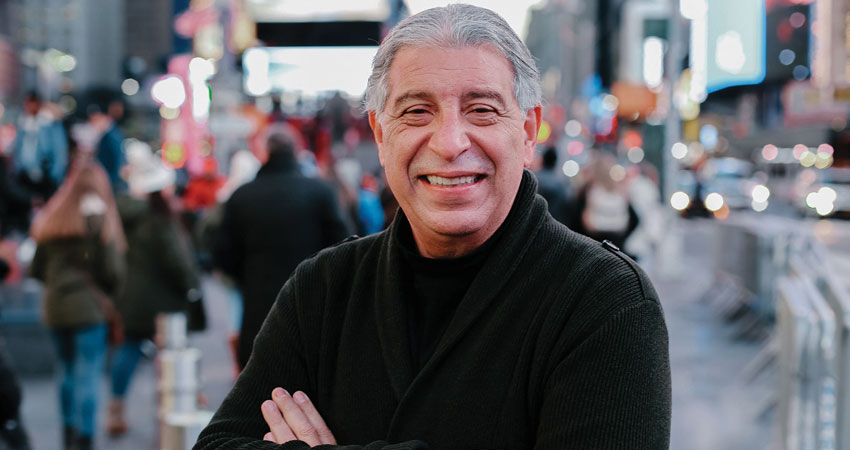“Stealing Past Watchful Dragons”
Max McLean is an award-winning actor and founder and artistic director of Fellowship for Performing Arts (FPA). Based in New York City, FPA produces theater from a Christian worldview to engage diverse audiences.
Among his numerous credits, McLean adapted for the stage The Screwtape Letters, C.S. Lewis Onstage: The Most Reluctant Convert, The Great Divorce, Mark’s Gospel, and Martin Luther on Trial. As an actor, he created the roles of Screwtape (London, New York, national tour) and C.S. Lewis in The Most Reluctant Convert (New York, national tour) and Mark in Mark’s Gospel, for which he received a Jeff Award—Chicago theater’s highest honor.
McLean’s narration of The Listener’s Bible received four nominations from the Audio Publishers Association and his stage work has received praise from various media outlets, including the New York Times, Boston Globe, and Wall Street Journal.

Max McLean as C.S. Lewis
Max Mclean: Reaction on campus to The Most Reluctant Convert was gratifyingly positive. Audiences represented a diversity of attitudes toward Lewis and the Christian faith, which is exactly what we hoped for. Some students were encouraged; some were challenged. We also performed at UC-Berkeley, where 1,600 people filled the auditorium, including 800 students.
Regarding our focus on universities, the Campus Initiative opens a new avenue for Fellowship for Performing Arts to pursue its mission of producing excellent theater from a Christian worldview to engage a diverse audience.
During their college years, young women and men are very likely as open as they will ever be to entertaining new ideas and allowing their assumptions to be challenged. We feel The Most Reluctant Convert fits very well in that economy. Plus, after each performance, I host a talk-back session where we can process together what we’ve just experienced. It’s a tremendous opportunity to let art and the truths of the Christian faith meet these young people where they are.

In February, Max McLean and the Fellowship for the Performing Arts produced “A Man for All Seasons” in New York City.
CU: Why does Lewis resonate with college students/intellectual seekers?
MM: First, as we learn in The Most Reluctant Convert, Lewis’ journey to faith covers many of the same bumpy roads most people travel. He faced a difficult upbringing, from the early death of his mother to being raised by an overbearing father who could be quite harsh. He endured the horrors of the trenches in World War I. He was a committed, articulate atheist who, as he said of himself, was dragged “into the kingdom kicking and struggling.” Truly, a reluctant convert.
The flawed humanity in need of grace that he openly shares in his writings resonates as much now as it did more than 60 years ago. In fact, every year he sells more books than he did the year before.
Second, while he was a towering intellect and rigorously honest in academic pursuit of any subject, he simultaneously had an ability to relate profound truths in a way that is not only accessible to almost anyone, but also engagingly winsome.
He’s the very example of what we hope to do with FPA productions—to present a view of the Gospel that is honest, multi-layered, and winsome.
CU: You recently quoted Lewis’ phrase of “stealing past those watchful dragons” when it comes to overcoming stigmas and preconceived notions. How does FPA emulate this, especially in today’s culture, where claims of absolute truth are looked down upon?
MM: We begin with careful attention to selecting works we think can accomplish this. Next, we strive to execute our artistic vision to the highest level of excellence our budgets allow. Part of achieving this is to attract a first-rate cast and creative team.
Still, I’m aware that, despite the best of intentions, for some the notion of a “religious” play might send up a yellow flag. During our first New York season, several reviewers expressed this skepticism in print. One critic, upon discovering our worldview, wrote “my heart sank.” Another made the understatement that presenting plays from a place of religious conviction “to a general audience is no easy thing.”
In both cases, it was the work that led them to reconsider. The first declared, “I expected a preachy bore, not this deliciously witty, theatrical treat that still resonates and amuses the day after.” He went on, “I expect that, like the first, [the next production] will be entertaining, very well-staged and imbued with serious Christian thought and an earnest invitation to introspection.”
The second critic began by stating that he was “Jewish by birth, liberal by conviction, and an atheist by observation and introspection.” He went on to express “how much I admire the approach of Fellowship for Performing Arts...They do their work through a careful combination of good storytelling—craft comes first...allowing any message implicit in the material to take care of itself.”
So, if we choose the right work to share the right message and do so with excellence, we feel we’ve done our job.
CU: What advantages do artists have in “stealing past watchful dragons” that pastors and church leaders do not? Is that happening in today’s culture?
MM: This has certainly come full circle. There was a time when so much great art came out of the church (and actors could not be buried in a church cemetery!). In today’s polarized society, an artful presentation of Christian truth can be the “front door” through which someone enters or returns to faith.
One couple in the Midwest invited three neighboring couples to their home for three nights over three weeks to read a Lewis book together. The fourth week, they attended The Most Reluctant Convert and have continued discussing their experience.
Had they asked their neighbors to a play at their church, instead of the leading performance venue in their community, would the outcome have been different?
Plus, I believe that art hints at the deeper structures of reality. “God has placed eternity in our hearts,” Ecclesiastes says. Art has a way, as you mentioned earlier, of sneaking past the “watchful dragons” of skepticism and cynicism to fan that eternal spark.
And, yes, it’s happening in today’s culture. Our work is an example, but there are many artists in film, music, and more who pursue similar goals. There needs to be more.
CU: FPA recorded the Audio Bible many years ago, and today you are the voice of several translations on Bible Gateway. How did you approach that responsibility?
MM: With humility. The wired and digital age we live in means God’s Word can be heard almost anytime, anywhere. As an actor, you are taught to respect the text, and that is nowhere more important than when the text is the inspired Word of God.
I heard recently that The Listener’s Bible is being used to teach English in China. Just another example of how art and truth can combine to create opportunities.
CU: How has playing such a wide range of roles (Lewis, Screwtape, Gospel of Mark) affected your own spiritual formation?
MM: I’ve been fortunate to spend extended amounts of time with the Bible and the works of Lewis in preparation for performing them, which includes memorizing great parts of them. The play based on Mark’s Gospel is that book in its entirety, but for Convert and The Screwtape Letters, hours were invested in Lewis’ writings to select the right material that honors his intent and makes for good theater.
Those experiences certainly deepened my understanding of the Gospel message, God’s love and power, our enemy’s wiles, and our need to rely on God.
CU: What role does prayer play in preparation for your performances?
MM: Prayer plays an important role in every aspect of Fellowship for Performing Arts, and that goes beyond my personal prayer life.
As a staff, we meet weekly to pray for upcoming performances, among many other things. And we have a dedicated Prayer Team that petitions God for each performance.
We strive to be aware that our responsibility is to do the best work we can and never lose sight that it is the Lord who animates our efforts for His purposes.
CU: What is a Bible verse that comes to mind when you think of the arts and Christianity, and why?
MM: Ephesians 2:10 has been a foundational verse for me from FPA’s founding over 25 years ago until now: “We are God’s handiwork, created in Christ Jesus to do good works, which God prepared in advance for us to do.”
At FPA, we feel the good work we are to be about is using every talent we have to introduce people to a Christian worldview of reality. Artistic expression is our vehicle for being “God’s handiwork” and, hopefully, prayerfully, seeing Him use us for His kingdom.





